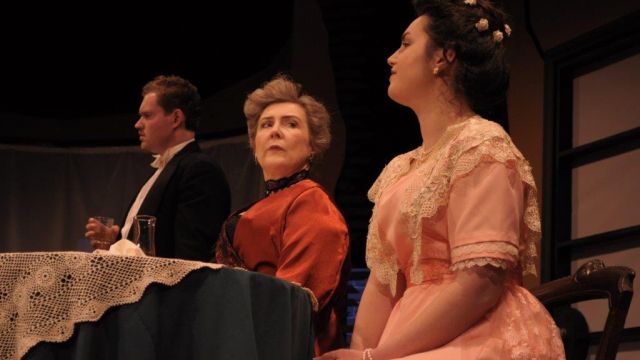An Inspector Calls
Good theatre provokes and makes us think. An Inspector Calls is a parlor play which will leave you pondering, posing more questions than it does answers. Whilst being a play of social comment, pitting capitalism against socialism, it is riddled with dramatic irony and a plot which is very different to most murder mysteries.
An Inspector Calls by J B Priestley, is a play that revolves around the apparent suicide of a young woman called Eva Smith. The wealthy bourgeois Birling family, living in the north Midlands in 1912, are visited by a mysterious inspector named Goole. He arrives during the celebrations for the engagement of Sheila Birling to Gerald Croft. He shocks the family by announcing that he is investigating the apparent suicide by Eva Smith, her life taken by drinking disinfectant. After initial confusion as to why the Inspector would want to speak to them, the plot unravels to reveal that the family and Sheila’s fiancé Gerald Croft are all caught up in this poor girl's death. Or so it seems.
An Inspector Calls was first performed in 1945 post World War 2. Life was changing and class systems were beginning to break down. The play is set in 1912 -the characters know nothing about the war to come nor the sinking of the unsinkable Titanic- Priestley uses irony to great effect here. Priestley himself, a socialist, launches a scathing criticism of Edwardian and Victorian society and middle-class hypocrisy. He seems to show the contrast between socialism and capitalism in the forms of The Inspector and the father of the family, Arthur Birling. Likewise, it is interesting that only the two younger members of the family show the beginnings of a social conscience.

In this performance by Therry Society, I was struck immediately at curtain rise, by the seemingly incongruous set, designed by Don Oswald. Whilst beautifully dressed, in place of a standard box set, there are random jagged shapes and a section of wall which appears unfinished- the interior of a building showing. I waited to see why this would fit into a period piece in 1912. As the story unravels its metaphorical statement becomes clear – a fractured family, a fractured society and a story which looks beneath the one-dimensional façade of the privileged one percent. A stroke of brilliance.
The first act is very wordy with lengthy monologues building up the story of each character’s connection to this young woman. Whilst the story telling is necessary, I felt it lagged at times in pace on opening night. The blocking of this act is also quite static but possibly intentional by the director to focus attention on the Inspector and the shock of the characters. Act 2 picks up considerably in pace and action and the climactic and disconcerting ending is very well done.
The team of actors assembled by director,Angela Short work hard in their respective roles - each the epitome of the society of the time. Patrick Clements, as Arthur Birling is pompous and self -assured. I found his voice quite jarring at times as he forced it a little too much to be bombastically gruff. Matthew Chapman, as Gerald Croft, cleverly struts about the stage, delivering his lines with a perfect accent - the very essence of white male privilege and the ‘man about town’. Lani Gerbi is a delight as the daughter Sheila, the spoilt rich girl who was supposedly responsible for Eva Smith losing her position in a shop. She has great poise and stage presence. Dylan O’Donnell is a standout as the spoilt, frequently drunk pratty son, Eric. He has impeccable stage timing and embodies the physicality of the character well. Rebecca Kemp is solid as Sybil, the mother of the family, who is unwavering in her self-confidence and certainty of her moral values. Kemp is a lovely actress, but at times not perfectly heard on opening night. Heather Riley as the Maid brings a solid performance to a small role. Most impressive was Mark Drury as Inspector Goole. He is the perfect ringmaster to the various ‘acts’ which he reveals to the family. He is commanding and watchable and weaves the story well.
 Costumes by Gillian Cordell, Sandy Faithfull and Lani Gerbi are excellent and period apt. Lighting by Richard Parkhill is simple but complements the unusual set well.
Costumes by Gillian Cordell, Sandy Faithfull and Lani Gerbi are excellent and period apt. Lighting by Richard Parkhill is simple but complements the unusual set well.
Angela Short has brought to the stage a very clever and different piece of theatre and tells a tale that leaves us guessing. Who is the strange inspector? Is there some play on words with his last name being similar to ‘ghoul’? Is he real or does he represent the family’s conscience?
We are left with an uncomfortable feeling that this play has great relevance and universal truth today, in a society which seems also at times to be fractured. Goole’s monologue before his departure, about humans being “all members of one body”…that we are “responsible for each other”, resonated well.
A very good night out at the theatre
Shelley Hampton
Subscribe to our E-Newsletter, buy our latest print edition or find a Performing Arts book at Book Nook.

